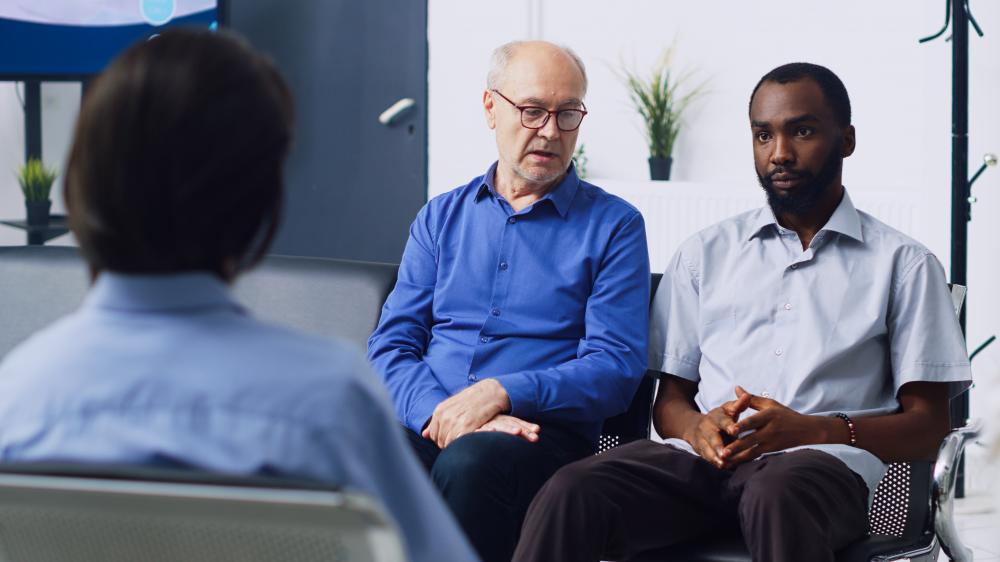
Understanding Group Therapy
At Wildwood Recovery, we recognize the power of healing that comes from being part of a community. Group Therapy, as a core component of our addiction treatment programs, offers a unique environment where individuals can share experiences, challenges, and successes with others on similar journeys towards recovery. The collective wisdom and support found in these groups can be incredibly empowering.
Benefits of Group Therapy
The therapeutic landscape of Group Therapy is fertile ground for personal growth and understanding. Participating in a group setting allows individuals to see their struggles through the lens of others, providing perspectives that might remain unexplored in individual therapy sessions. It fosters a sense of belonging, reduces feelings of isolation, and cultivates empathy and support among members. The group dynamic encourages transparency and vulnerability, key components in the recovery process.
Types of Group Therapy
In our programs at Wildwood Recovery, we incorporate various Group Therapy models tailored to meet the diverse needs of our clients. This multifaceted approach ensures that everyone can find a group that resonates with their personal recovery journey.
- Cognitive Behavioral Groups: These sessions focus on identifying and changing harmful thought patterns and behaviors.
- Skills Development Groups: Here, the emphasis is on building new skills to manage stress, triggers, and cravings, essential for long-term recovery.
- Support Groups: These gatherings provide a platform for shared experiences, fostering a strong community of peers committed to sobriety.
- Dynamic Group Therapy: This approach looks deeper into individual behaviors and character traits, encouraging introspection and personal growth.
Integrating Group Therapy into Treatment
Integrating Group Therapy into the broader treatment plan at Wildwood Recovery allows for a holistic approach to addiction recovery. Beyond addressing the physical aspects of addiction through detoxification and medication-assisted treatment, Group Therapy focuses on the emotional and psychological healing necessary to maintain sobriety. Our therapists and clinicians facilitate these groups with the goal of creating a safe, supportive environment where individuals can openly share and learn from each other.
Challenges and Solutions in Group Therapy
While Group Therapy is an effective modality, it’s not without its challenges. Some individuals may initially resist the vulnerability required in a group setting. At Wildwood Recovery, we address these concerns by ensuring our groups are led by experienced therapists who are adept at fostering a supportive atmosphere. Gradually, members find comfort and confidence in sharing their stories, leading to profound personal insights and breakthroughs.
Another challenge is ensuring the right mix of participants in each group to facilitate productive sessions. We meticulously assess each client’s needs, recovery stage, and personality to place them in the most appropriate group. This careful curation maximizes the therapeutic benefit for all members.
Personal Stories of Recovery
In my years at Wildwood Recovery, I’ve witnessed firsthand the transformative power of Group Therapy. I recall a client who, after weeks of silent participation, shared their story of struggle and resilience. This moment was not only a turning point for the individual but served as a catalyst for others in the group to open up, deepening the collective healing process. It was a poignant reminder that while the road to recovery is personal, it need not be lonely.
Embracing the Journey
Recovery is a journey of healing and discovery, one that benefits greatly from the shared experiences and mutual support found in Group Therapy. At Wildwood Recovery, we celebrate this journey, offering a range of Group Therapy options to complement our comprehensive addiction treatment programs. Our commitment to creating a supportive, therapeutic community helps pave the way for our clients’ successful recovery and long-term sobriety.
Conclusion
Group Therapy is more than just a treatment modality at Wildwood Recovery; it’s a crucial part of the fabric of our approach to addiction recovery. By harnessing the collective strength, wisdom, and support of the group, individuals are empowered to confront their addiction and reclaim their lives. The journey towards recovery is a path best walked with others, and through Group Therapy, our clients find not just healing, but hope and a sense of belonging.

What is meant by group therapy?
Group therapy is a form of psychotherapy involving one or more therapists working with several individuals simultaneously. It’s based in the belief that individuals can find healing through group interaction, providing a supportive environment where members can share experiences, offer each other guidance, and learn from each other’s journeys. Imagine it as a shared space where vulnerability turns into strength, allowing every participant to grow not only through personal reflection but also through the collective insights of the group. At Wildwood Recovery, we’ve seen time and again how this collective dynamic fosters profound personal growth and healing.
What is the main goal of group therapy?
The primary aim of group therapy is to provide a supportive environment that promotes emotional growth and healing. It’s about more than just talking; it’s about sharing experiences in a way that helps reduce isolation, learn new strategies for coping with challenges, and gaining insights into one’s thoughts, feelings, and behaviors. Through the group process, individuals can work on interpersonal relationships, improve social skills, and address issues in a way that fosters personal development. At its heart, the goal is to help participants find healthier ways to deal with their issues, contributing to overall well-being and recovery.
What are the three types of group therapy?
At Wildwood Recovery, we embrace a variety of group therapy models to cater to the diverse needs of our clients. The three core types include:
- Cognitive Behavioral Groups, which focus on identifying and changing unhelpful thought patterns and behaviors that contribute to substance abuse.
- Skills Development Groups, aimed at teaching new strategies for managing stress, triggers, and cravings, crucial for maintaining sobriety.
- Support Groups, which offer a platform for members to share experiences and offer mutual support, reinforcing the community aspect of recovery.
Each type of group is designed with the goal of facilitating recovery from a different angle, yet all share the underlying ethos of mutual support and personal growth.
What are 4 benefits of group therapy?
Group therapy offers numerous benefits, particularly in the context of addiction recovery:
- Shared Experience: Being part of a group allows individuals to realize they’re not alone in their struggles, providing comfort and reducing isolation.
- Perspective: Listening to others share can open new ways of thinking about one’s own issues, offering fresh insights and approaches to challenges.
- Support: The group provides a unique source of encouragement and accountability, empowering members to persevere through difficult times.
- Interpersonal Learning: Interacting with others in the group setting enhances social skills, teaches conflict resolution, and improves communication, which are critical for personal and professional relationships outside of therapy.
These benefits illustrate why group therapy is such a powerful tool in the journey toward recovery and healing.
How does group therapy integrate with other treatment modalities at Wildwood Recovery?
At Wildwood Recovery, we see group therapy as a complement to a holistic treatment approach. It integrates seamlessly with other modalities, including individual therapy, medication-assisted treatment, and experiential therapies, to provide a comprehensive recovery experience. For instance, insights and breakthroughs that emerge in group settings can be explored further in individual sessions. Similarly, coping strategies learned through cognitive-behavioral or skills development groups can be supported and reinforced through other therapeutic activities. This integrative approach ensures that every aspect of an individual’s recovery journey is addressed, promoting lasting sobriety and well-being.
Resources
- National Institute on Drug Abuse (NIDA) – The NIDA provides information on various aspects of drug abuse, including treatment options and therapy modalities. Visit NIDA
- Substance Abuse and Mental Health Services Administration (SAMHSA) – SAMHSA offers resources on mental health and substance abuse treatment, including group therapy options. Visit SAMHSA
- American Psychological Association (APA) – The APA provides insights into different therapy approaches, including group therapy, and its benefits for individuals. Visit APA
- National Alliance on Mental Illness (NAMI) – NAMI offers support and education for individuals and families dealing with mental health conditions, including resources on group therapy. Visit NAMI